Choosing the right Internet Service Provider (ISP) means finding the right balance between price, speed, infrastructure and logistics. While price is always a major deciding factor, you’ll also want to consider what type of connection best suits your Internet usage style, what speeds you’ll need, and which providers serve your home. For example, a family of five will probably need different features than a serious gamer.
There are currently thousands of Internet service providers in the United States, ranging from a few large nationwide ISPs to many smaller local providers (or subsidiaries of large providers).
We’ve researched and reviewed several ISPs from across the industry and put together the 10 best ISP options for you to choose from.
The Top 10 Best Internet Providers in 2023:
- AT&T Internet: Best Overall Internet Provider
- Rise Broadband: best for users living in rural areas
- CenturyLink: Best for Families
- T-Mobile Home Internet: Best for Saving Money
- Xfinity Internet: Best for Gamers
- EarthLink – Best for Additional Business Services
- Cox – Best for gadget lovers and tech-savvy users
- Verizon 5G Home Internet: Best for users who need fast uploads and downloads
- Verizon Fios: Best for students and those who need high broadband speeds
- ViaSat: Best for remote customers who don’t mind slow speeds
A Closer Look at Our Top 10 Internet Service Providers
AT&T Internet
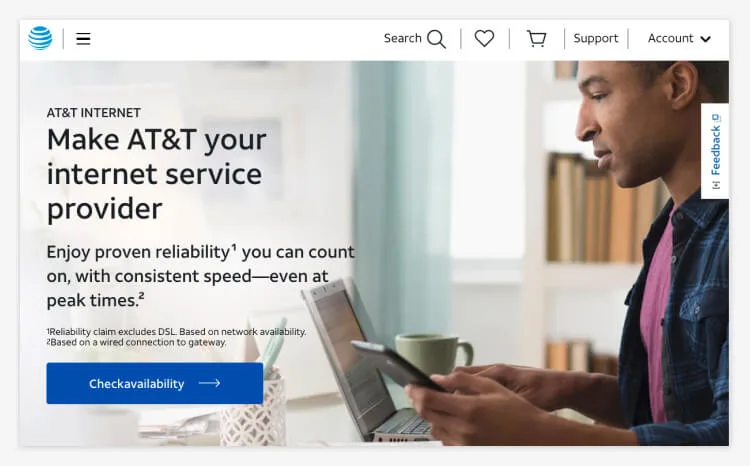
- The best to create a smart home
- Starting price $55 per month
- Connection type Fiber, fixed Internet
AT&T has many internet plans to choose from and they are all great options. The price is affordable worldwide and AT&T’s customer service has received a J.D. degree. for four consecutive years. Powers Customer Satisfaction Award for exemplary service. The 1000 Mbps speed is enough to power an entire home with WiFi capability, unlimited internet data, and faster download speeds than the competition. AT&T also has a great mobile app that makes managing your smart home faster and more convenient.
Pros
- 99% reliability rating
- Fast speeds, including fiber plans.
- Good customer satisfaction rates
Cons
- Limited coverage area for some plans
- Additional Expensive Fees
Rise Broadband
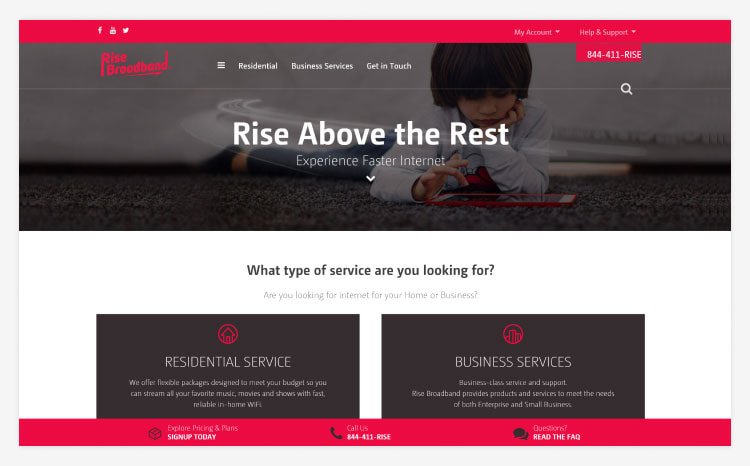
- The best for rural Internet
- Starting price $25/month
- Connection type Wireless, fiber
Rise Broadband offers rural areas a choice of Internet plans in lieu of fixed wireless services where wired Internet access, such as cable and fiber, is not available. This type of Internet connection is faster and cheaper than satellite Internet, so it may be the best option if you don’t have a cable option. Rise Broadband has also added a fiber optic option in very limited locations.
Pros
- Covers many rural areas with limited ISP options
- No equipment rental charges if you use your own router
- Unlimited data option
Cons
- Wireless Internet has some latency issues
- Unlimited data for wireless plans costs an additional $20
CenturyLink
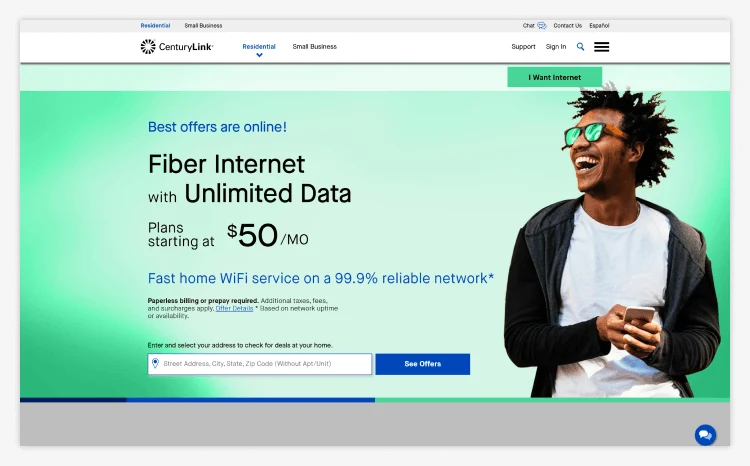
- The best for the family
- Starting price $55/month for DSL, $70/month for fiber
- Connection type: DSL, fiber
CenturyLink offers Internet in 16 states, with speeds ranging from 3 to 100 Mbps for DSL Internet and 100 to 940 Mbps for fiber, available only in select areas. Its advanced WiFi 6 technology enables faster connectivity, data transfer capabilities and longer battery life for home devices.
Pros
- Free wireless modem with Fiber Gigabit plan
- No annual contracts
- Integrated privacy and parental control tools
Cons
- DSL options are relatively expensive
- $149 setup fee on DSL plan
Xfinity

- The best for the family
- Starting price $19.99 per month
- Connection type Cable, fiber
Xfinity offers fast cable and fiber Internet options designed for almost any need. Great for gamers, streamers, multi-users, and families, Xfinity Internet has plenty of features to keep things interesting. Xfinity Internet comes with seven different plan options, including a prepaid monthly payment option. Customers can choose between cable or fiber depending on how important speed is to them. Available in 40 states, Xfinity Internet is more accessible and affordable than many competitors.
Pros
- Fast and reliable speeds
- Many plans to choose from and no contract option.
- Fun extras included in the plans
Cons
- Cannot purchase Xfinity equipment
- Great offer on equipment rental.
EarthLink
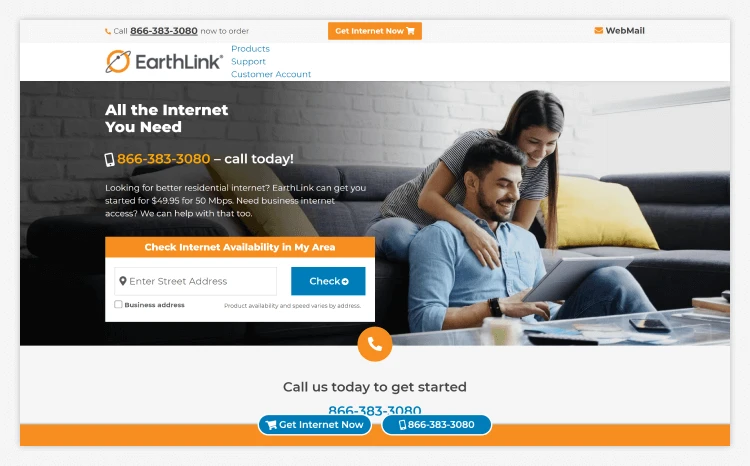
- Best for families, students, freelancers and gamers
- Starting price$49.95 per month
- Connection typeFiber, wireless and satellite
EarthLink offers fiber, wireless, and satellite internet plans in a variety of speeds. So you can find a plan that suits your needs, from light streaming and internet usage to heavy gaming, multi-user streaming, and even business plans up to 5000 Mbps. EarthLink also has no data caps. Therefore, you will never be limited while using the Internet.
Pros
- No data limits
- Many plans to choose from
- Great customer service
Cons
- The plans are a little higher than other ISPs.
- Availability by location
Cox
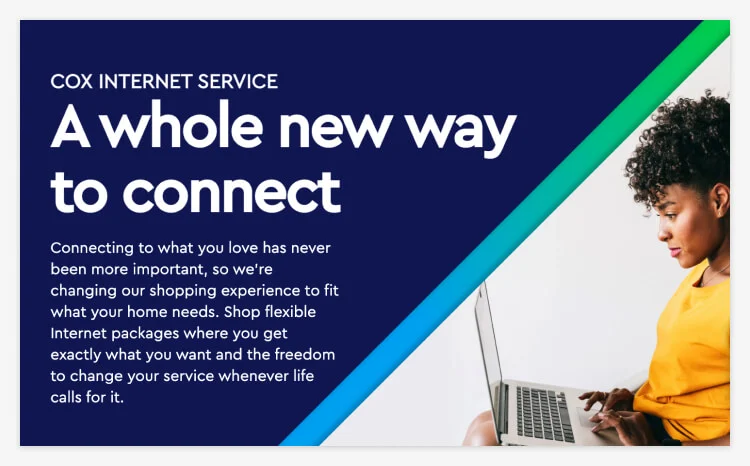
- Best for tech-savvy customers
- Starting price $29.99 per month
- Connection type: Fiber
Cox is one of the top providers because it offers all the right features and doesn’t hide anything. You can get important security features like digital data shredder, vulnerability scanner, and spyware protection built into your devices. Cox also offers fast connections that are consistent and even optimized for your current Internet activity. Cox has over 3 million hotspots nationwide and whole-home WiFi coverage for every area and device in your home.
Pros
- Great features at affordable prices
- Flexible plans that include prepaid Internet
- Expert Player Mode for almost lag-free gameplay
Cons
- Available only in 19 states
- It is difficult to determine the price immediately.
Verizon 5G Home Internet
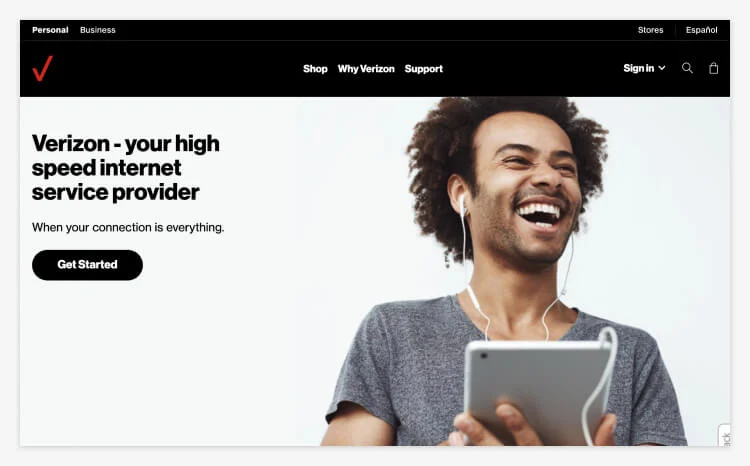
- The best to transmit
- Starting price $25 per month
- Connection type: Fiber
If you feel the need for speed, Verizon 5G Home may be the right ISP for you. With a fiber network that offers speeds of up to 940 Mbps, Verizon Fios is definitely the place to be for gamers, streamers, and anyone else who needs fast Internet or uses a lot of bandwidth at the same time. Verizon has no long-term contracts and has a 99.99% reliability rating for fast, consistent, unlimited bandwidth.
Pros
- High-speed connection with 99.99% reliability
- Service packages at a more affordable price.
- A great option for gamers, families and streaming lovers.
Cons
- Offered only in 10 states
- No public WiFi hotspots
Verizon Fios
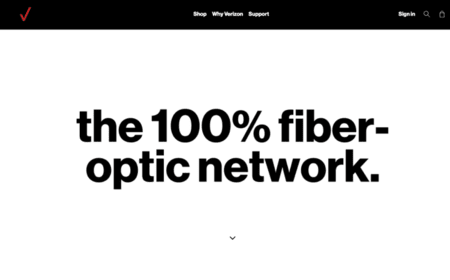
- The best for families, students.
- Starting price of $39.99 per month
- Connection type: Fiber
If you feel the need for speed, Verizon Fios may be the right ISP for you. With a fiber network that offers speeds of up to 940 Mbps, Verizon Fios is definitely the place to be for gamers, streamers, and anyone else who needs fast Internet or uses a lot of bandwidth at the same time. Verizon Fios has no long-term contracts and has a 99.99% reliability rating for fast, consistent, unlimited bandwidth.
Pros
- High-speed connection with 99.99% reliability
- Service packages at a more affordable price.
- A great option for gamers, families and streaming lovers.
Cons
- Offered only in 10 states
- No public WiFi hotspots
ViaSat
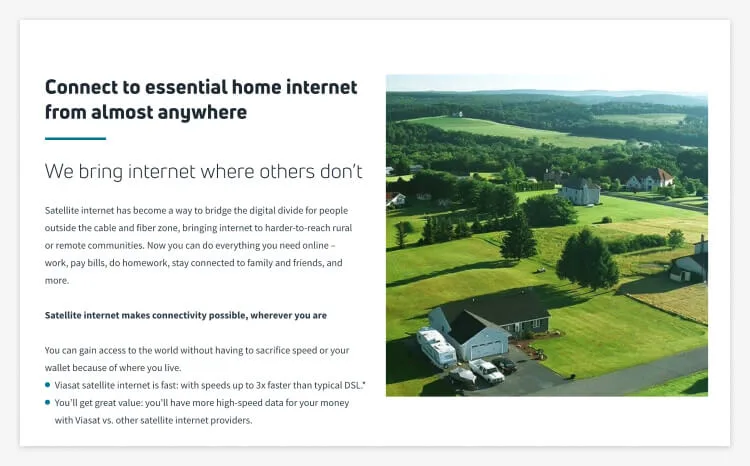
- Best for remote users
- Starting price $64.99 per month
- Connection type Satellite, hybrid DSL
Viasat is another satellite internet provider that offers reliable service in the US, including Hawaii and Puerto Rico. It’s among the best satellite options on the market and offers a selection of plans with different upload speeds, download speeds, and data limits.
The good news is that although Viasat plans come with data caps, you’ll still have access to unlimited internet if you get them, albeit at much slower speeds. Unfortunately, their prices are exorbitant and you will have to pay a monthly equipment rental fee of $13 on top of the advertised price.
Pros
- Quite reliable
- Quick connections available
- Excellent nationwide coverage
Cons
- Low data thresholds
- Expensive
Reviewing the Top Internet Providers: Our Methodology
oneTop10.com Internet Service Provider reviews are based on objective facts. Our reviews are based on research conducted through Internet service provider websites, trusted third-party websites, customer reviews, and free product trials or, in some cases, paid usage.
It is not always possible to use the product throughout its life. However, reviewers will attempt the registration process, make customer service inquiries to test response times, and perform any other functions possible during the review period. For the rest of the information, we rely on what the brand says about its own product offering, customer reviews and complaints, ratings from independent agencies like BBB, and credible news publications.
Some of the key features we compared when analyzing the Internet Service Providers on our list were:
- Price:
- Connection type:
- Download speed
- Coverage
Types of Internet Service
There are several different types of Internet services that vary in their availability and connection method. Some of the most common include the following:
- DSL (digital subscriber line) is one of the slowest services, but also one of the most available.
- The cable offers higher speeds and greater reliability.
- Fiber is the fastest Internet service, with many providers offering speeds greater than 1 Gbps.
- Mobile broadband includes access to the Internet over a mobile network.
- Satellite broadband is widely available, but can be expensive and slow.
The types of Internet services you have access to will depend largely on your geographic location.
How to Choose an Internet Provider
To help you choose the right internet service provider, we have listed some of the most important things to keep in mind.
- internet speed
The speed is obvious. If you plan to use your Internet connection to play games or stream content, you’ll need faster upload and download speeds. But if you just need something basic for general browsing, a slower plan should suffice.
- Customer service
Having access to quality customer service will make your life much easier if you have any connectivity issues. Reviews from previous customers often shed light on a company’s level of customer service.
- Installation and equipment costs.
This is a trick that may surprise you. Some ISPs include installation and equipment costs in their monthly rates. But many don’t. Setup costs for some providers exceed $100, and equipment rental fees can reach $20 or more per month.
- Data limits and overage charges
Pay special attention to the data thresholds associated with the plans you are considering. What happens if you exceed your data allowance? Will your connection slow down or incur high overage fees?
- Contracts
Some providers offer contract-free services, but others require a 12, 24, or even 36-month contract. Early termination can be very costly.
How Much Internet Speed Do You Need?
Determining how much internet speed you need can be difficult. High-speed plans can be expensive. But on the other hand, you’ll want a connection that’s fast enough to enjoy what you want to do.
- How do I know what a good Internet speed is?
Generally, any connection with a download speed greater than 25 Mbps is considered “good,” while an upload speed of 3 Mbps falls into the same category. Please note that you may not always achieve the speeds advertised by your ISP.
- How to measure and check my Internet speed?
There are many tools available online to test your internet speed. Our favorite is the native Google tool. Simply type “Internet Speed Test” into Google search and follow the instructions.
- How do I know if I need more Internet speed?
If you’re having trouble doing the things you want to do online, you may need a faster connection. For example, if your video stream is constantly buffering or not streaming in high quality, or if your gaming experience is slow, you may need a faster connection.
How Much Does an Internet Service Provider Cost?
The average price of an Internet subscription varies significantly by geographic location. In urban areas, you should have no problem finding a basic plan for $30 a month or less. Higher speed plans are more expensive, but prices rarely exceed $100 per month.
On the other hand, you can expect to pay much more if you live in a rural or remote area. Mobile broadband or satellite are often the only options available and can be much more expensive.
You should also pay attention to any other charges associated with your connection. These may include installation fees that can exceed $100, equipment rental fees, and overage fees. Overage charges can be particularly exorbitant, and you could end up paying hundreds of dollars if you unknowingly exceed your data limit.
Final Thoughts on Picking an Internet Service Provider
It is important that you take your time when choosing a new Internet service provider. It can be difficult to understand the contract terms, pricing structure, and exactly what is included in each plan. Follow the tips above and don’t hesitate to take some time to research the options in your area.
Once you’ve decided what type of connection you need, it’s a good idea to set a budget and adjust your connection speed. Make a short list of service providers that meet your criteria and do more research on them.
In most cases, of course, you will only have a few options that offer the service you require, making the selection process easier.
Finally, remember to pay special attention to hidden fees and contract terms to avoid unpleasant surprises in the future.

Leave a Reply